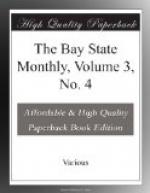The watchword of the impending conflict was sounded by Stephen A. Douglas, one of the most powerful and energetic of public leaders, a recent candidate for the presidency, and the life-long political antagonist of Abraham Lincoln. On Sunday, the 14th of April, while the ink was scarcely yet dry upon the written parchment of the proclamation, Mr. Douglas called at the White House, and, in a long interview, assured his old antagonist of his readiness to join him in unrelenting warfare against Rebellion. Shortly afterwards he departed for his home in Illinois, where, until his death, which occurred a few weeks later, he declared, with masterly eloquence, that,—
“Every man must be for the United
States or against it; there can
be no neutrals in this war—only
patriots and traitors.”
“Hurrah! the drums are beating;
the fife is calling shrill;
Ten thousand starry banners flame on town,
and bay, and hill;
The thunders of the rising wave drown
Labor’s peaceful hum;
Thank God that we have lived to see the
saffron morning come!
The morning of the battle-call, to every
soldier dear,—
O joy! the cry is “Forward!”
O joy! the foe is near!
For all the crafty men of peace have failed
to purge the land;
Hurrah! the ranks of battle close; God
takes his cause in hand!”
[Footnote 1: “If, through the madness of Northern abolitionists, that dire calamity (disruption of the Union) must come, the fighting will not be along Mason and Dixon’s line merely. It will be within our own borders, in our own streets, between the two classes of citizens to whom I have referred. Those who defy law, and scout constitutional obligation, will, if we ever reach the arbitrament of arms, find occupation enough at home.”—Letter to Jefferson Davis, dated January 6, 1860.]
[Footnote 2: The word “must” is italicized in the original letter. See Official Records of the Rebellion, Vol. I., p. 76.]
[Footnote 3: See Official Records of the Rebellion, I., p. 77.]
* * * * *
TOMMY TAFT.
A STORY OF BOSTON-TOWN.
By A.L.G.
Tommy Taft, or T.T. as he was wont to call himself, had always regretted two misfortunes,—first, the indisputable fact of his birth, and second, the imprisonment of his father, not long afterwards.
The earlier misfortune, Tommy Taft, not being at the time aware of it, was of course quite unable to prevent. The later misfortune it was alike beyond his power to forestall. It came to pass that young Tommy Taft grew up to be as crude a specimen of body and soul as had ever flourished in Boston-town.
I have not set myself the task of following the drift of his life from the dawn of babyhood to the twentieth anniversary of the same. But one event ought to be here recalled, which was, that on a certain day Tommy Taft was at work in a garden and in just that part of the garden, it ought to be said, where the wall was so low that a person could easily look over it into the long, narrow road.




